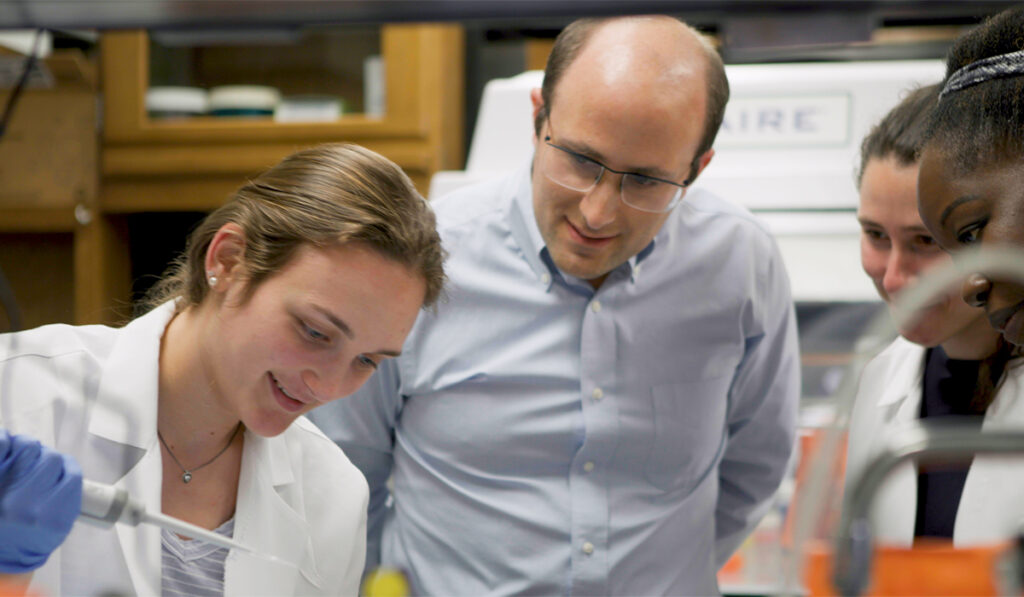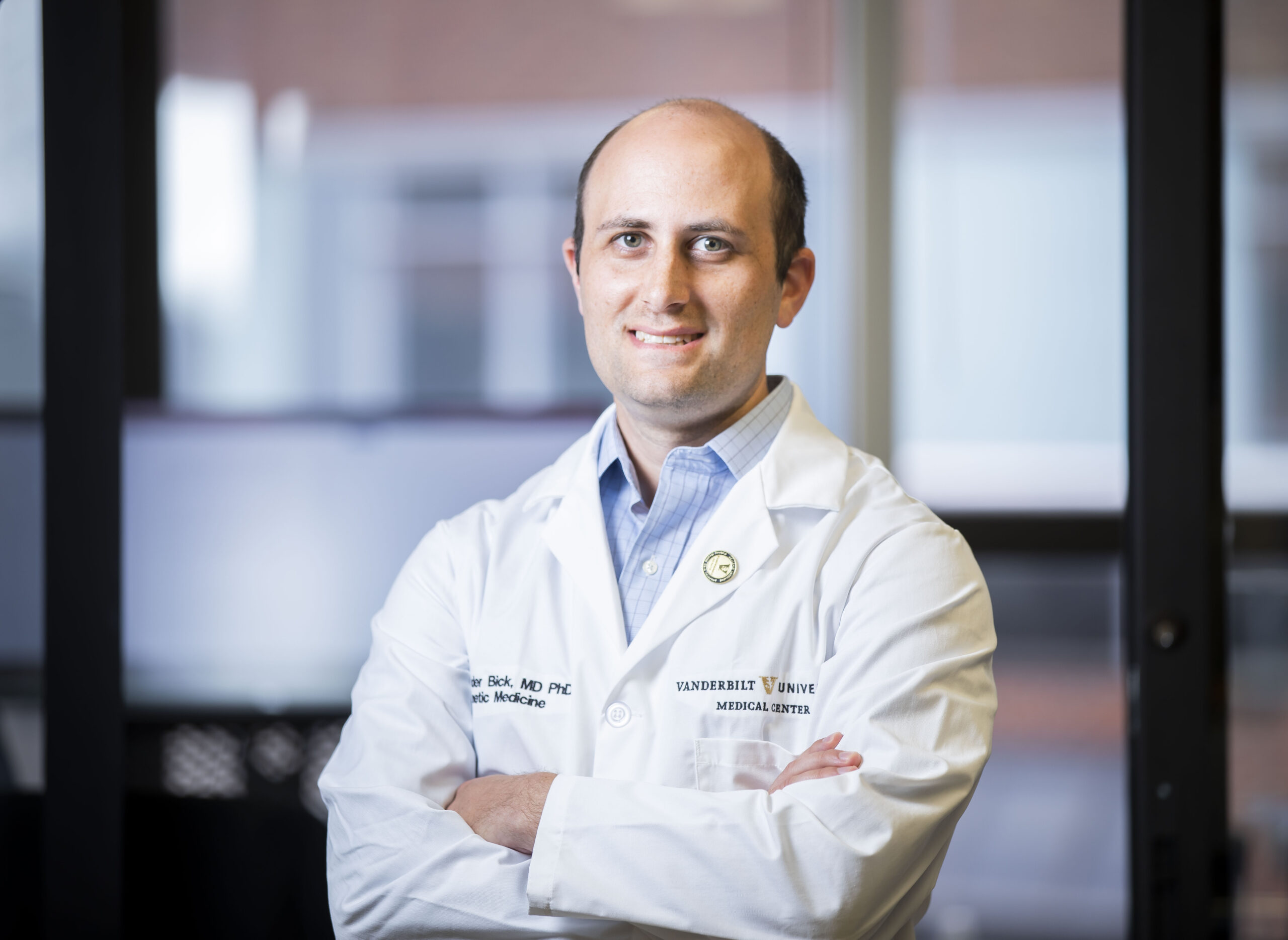An age-associated, pre-cancer condition of the blood called clonal hematopoiesis of indeterminate potential (CHIP) affects 10-20 percent of people over 65, rising steeply until end-of-life.
The blood anomalies eventually damage organ systems, raising the risk of death by an estimated 40 percent.
Alexander Bick, M.D., Ph.D., a physician-scientist in genomics at Vanderbilt University Medical Center, has been a pioneer in discovering and elucidating CHIP mechanisms over the past decade. Recently, he served as principal investigator in a study to identify epigenetic and proteomic patterns associated with hematopoietic clonal expansion in the condition.
“We were able to identify a gene mutation and proteins that may be potential targets for preventing or dampening the clonal expansion rate associated with CHIP,” said Bick, was joined in the work by first author and graduate student Taryalynn Mack, as well as researchers in the U.S. and Taiwan.
Bick was funded to pursue this line of research as winner of the New Investigator Award in Aging Biology and Geroscience Research. This recognition came from the American Federation for Aging Research (AFAR) and the Hevolution Foundation.
Inflammatory Rampage
Over the past two years, Bick has been immersed in the mystery of why CHIP’s impact is not confined to simply a higher risk of blood cancers.
“We found that people who had these CHIP pre-blood cancers were at much greater risk of blood cancer, which makes sense, but they’re also just at greater risk of dying,” he said. “And that didn’t make sense at all, because there’s not enough blood cancer out there to be causing this death rate.”
Heart failure, cardiovascular disease, peripheral artery disease, kidney disease and more were all associated with the clonal expansion that characterizes CHIP.
Bick’s team searched for commonalities, and found “what they have in common is inflammation.
“The pre-blood cancer mutations drive inflammation as the blood cells differentiate into macrophages and other inflammatory blood cells. These circulate through the body, wreaking havoc in various organ systems.”
“The pre-blood cancer mutations drive inflammation as the blood cells differentiate into macrophages and other inflammatory blood cells.”
Epigenetic Roots
The study aimed for a better understanding of the clonal expansion that drives this inflammation on an epigenetic and molecular level. Using data from the Framingham Heart Study, which involved 4,370 individuals in the National Heart, Lung, and Blood Institute (NHLBI) Trans-Omics for Precision Medicine (TOPMed), the team calculated the expansion rate and polygenic risk scores for DNA methylation aging, inflammation-related measures, and circulating protein levels.
To drill down on the association between the clonal expansion and age, Bick developed a novel means of measuring the rate of “passenger mutations” accruing incrementally over a lifetime.
“You can think of passenger mutations like rings on a tree,” Bick said. “The more rings a tree has, the older it is.”
The clonal expansion rate was significantly associated with genetically predicted and measured epigenetic clocks that estimate biological age, time-to-death and time-to-disease based on DNA methylation-based markers for plasma proteins.
Further, they found that in about two-thirds of people who have CHIP, the cloning is driven by a germline gene mutation in DNM3TA that changes the epigenome and that certain specific inflammatory pathways were associated with specific pre-cancerous mutations.
“Generally, cancer mutations are not related to the epigenome, but to signaling pathway defects.
So, our approach to personalizing the care of these patients may have to be at the level of the gene and mutation.”
No associations were identified between inflammation-related lab values and the clonal expansion rate. Bick explains that this indicates that inflammation in general – whether from autoimmune diseases or elevated inflammatory lab values – did not drive faster clonal expansion.
“We found that inflammation in CHIP is effect, not cause,” he said.
Proteins Identified
The researchers identified an association between circulating levels of myeloid zinc finger 1 and anti-Müllerian hormone with an increased CHIP clonal expansion rate. Conversely, the tissue inhibitor metalloproteinase 1 and glycine N-methyltransferase were associated with a decreased rate.
“These mutations are occurring, and they are making highly inflammatory cells, so we could administer medicines that might modulate inflammation,” Bick said. “A different strategy is to think about what we can do to actually treat the clone itself. Can we prevent a small clone from becoming a big clone by intervening in the production of these proteins, for example?”
“A different strategy is to think about what we can do to actually treat the clone itself. Can we prevent a small clone from becoming a big clone by intervening with the production of these proteins, for example?”
CHIP Screening Ahead
Bick says that every week at Vanderbilt there are a handful of patients who are diagnosed with CHIP, but usually incidentally through blood draws for breast or other cancers.
“All of a sudden, they are finding mutations in their blood, not in their tumor,” he said. “We are referring these patients to our cardio-oncology specialists, because their cancer is likely treatable, perhaps curable, depending on the stage. But their risk of heart disease now is something that needs to be further optimized.”
Bick says routine screening for CHIP may be 10 or so years out.
“As we identify specific treatments that we would do differently, I could definitely imagine a future where, as you turn 65, you get tested for it, and if you have it, we start treating you very differently in terms of some of the medicines we use.”




